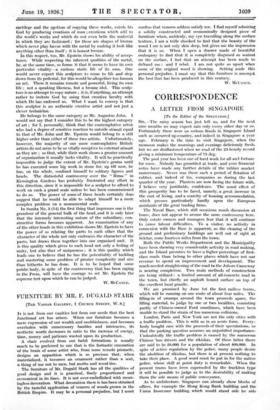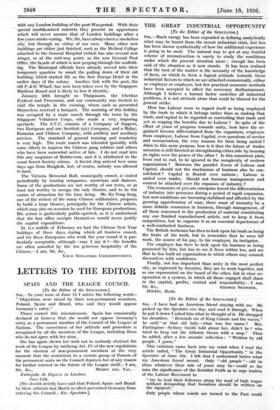CORRESPONDENCE
A LETTER FROM SINGAPORE
[To the Editor of the SPEcraTon.1 SIE,—The rainy season has just left us, and for the next nine months we may expect rain only every other day or so. Fortunately there were no serious floods in Singapore Island such as occurred up-country, and indeed in Singapore a year ago. February is the time to visit Singapore, when the monsoon makes the mornings and evenings deliciously fresh, but we are disillusioned when we read of the 24-hourly record giving a minimum temperature of 73 deg.
The past year has been one of hard work for all and fortune for sonic. Nobody has grumbled at trade, and your financial notes have made any further details of the rubber market unnecessary. Never was there such a period of flotation of rubber, and indeed of tin, companies as during the last quarter of the year. Planters are now facing the future with, I believe very justifiable, confidence. The usual effect of this prosperity has to be faced, namely, a great increase in the cost of living, and a scarcity of housing accommodation, which presses particularly hardly upon the European assistants of the great trading firms.
The Naval Base, which still occasions much discussion at home, does not appear to arouse the same controversy here. Only estate owners and managers fear that it will continue to cause labour difficulties. To a visitor, no activity in connexion with the Base is apparent, as the clearing of the ground and preliminary buildings are well out of sight at Seletar, some fourteen miles from the town.
Both the Public Works Department and the Municipality have been showing very considerable activity in road making, and the Island promises to have a higher percentage of first- class roads than belong to other places which have not our revenue to spend on improvement and development. The much-needed straightening of the road to the Johore Causeway is nearing completion. Two main methods of construction are being utilized : a limited amount of all-Oonerete road in the town,- but chiefly an asphalt bound surface on top, of the excellent local granite.
We are promised by June 1st the first railless trains, which will be running on one route of about four miles. The filling-in of swamps around the town proceeds apace, the filling material, to judge by one or two localities, consisting partly of Chinese-owned Ford omnibuses, which have been unable to stand the strain of too numerous collisions.
London, Paris and New York are not the only cities with a traffic problem. This is with us in an acute form. Every- body bought cars with the proceeds of their speculations, so that the parking question assumes an unjustified importance. Undoubtedly the traffic problem is caused by the numerous Chinese 'bus drivers and the rikishas. Of these latter there are said to be 20,000 for a population of about 400,000. In spite of active regulation by the police, many people desire the abolition of rikishas, but there is at present nothing to take their place. A good word must be put in for the native police, whose skill at point duty is remarkable. When the present trams have been superseded by the trackless type it will be possible to judge as to the desirability of making them the sole means of public conveyance.
As to architecture, Singapore can already show blocks of offices, for example the Hong Kong Bank building and the Union Insurance building, which would stand side by side
with any London: building of the post-War period. With their special marble mixed Concrete they present an appearance which Will' never assume that of London buildings after a few years smoke-curing. We; Sir, have always been a sinokeless city, but through :no virtue of our own. Many other new buildiiigs are either just finished; such as the Medical College attached to the General Hospital (which has also several new wings), or at the mid=way point, as the new General Post Offiee; the façade of which is how peeping through the scaffold- ing. The Municipal officials have already moved into their temporary quarters • to await the pulling down of their old building, which started life as the first Europe Hotel in the earlier days of the colony. Another link with the past, the old P. SL O. Wharf, has now been taken over by the Singapore Harliour Board and is likely to loSe it identity. January 28th brought us Thaipusam, the °Chettiar Festival and Procession, and our community was invited to visit the temple in the evening, where such as presented theMselves received a bouquet. The morning of this hOliday was_ occupiedby route march through the town by the .
Singapore Volunteer Corps, who made a very imposing speCtacle. The S.V.C. consists of a CoMpany of Sappers, two EtirOpean and_one Scottish (sic) Company, and Malay, Eurasian and Chinese Company, with artillery and auxiliary services. The standard of general training and musketry is very high. The route march was intended (pOssibly with some effect) to impress the Chinese gang robbers and others who have been somewhat active of late. I do not read into this any suspicion of Bolshevism, and it is attributed to the usual Secret Society crimes. A Soviet ship arrived here some days ago from Bangkok, but, of course, nobody was allowed to land.
The Victoria Memorial Hall, municipally owned, is visited periodically by touring companies, musicians and dancers. Some of the productions are not worthy of our town, or at least not worthy to occupy the only theatre, and to be the centre of attraction for the time being. Mr. Eu Tong Seng, one of the richest of the many Chinese millionaires, proposes to build a large theatre, principally for the Chinese artists, which may also on occasion be used for European productions. His action is particularly public-spirited, as it is understood that the box office receipts themselves would never justify the capital expenditure.
In tl.e middle of February we had the Chinese New Year holidays of three days, during which all business ceased, and for those Europeans who work the year round it is par- ticularly acceptable, although—may I say it ?-•-the benefits are often annulled by the too generous hospitality of the Chiuese.—I am, Sir, &e., VOT..TR SINGAPORE CORRESPONDENT.











































 Previous page
Previous page